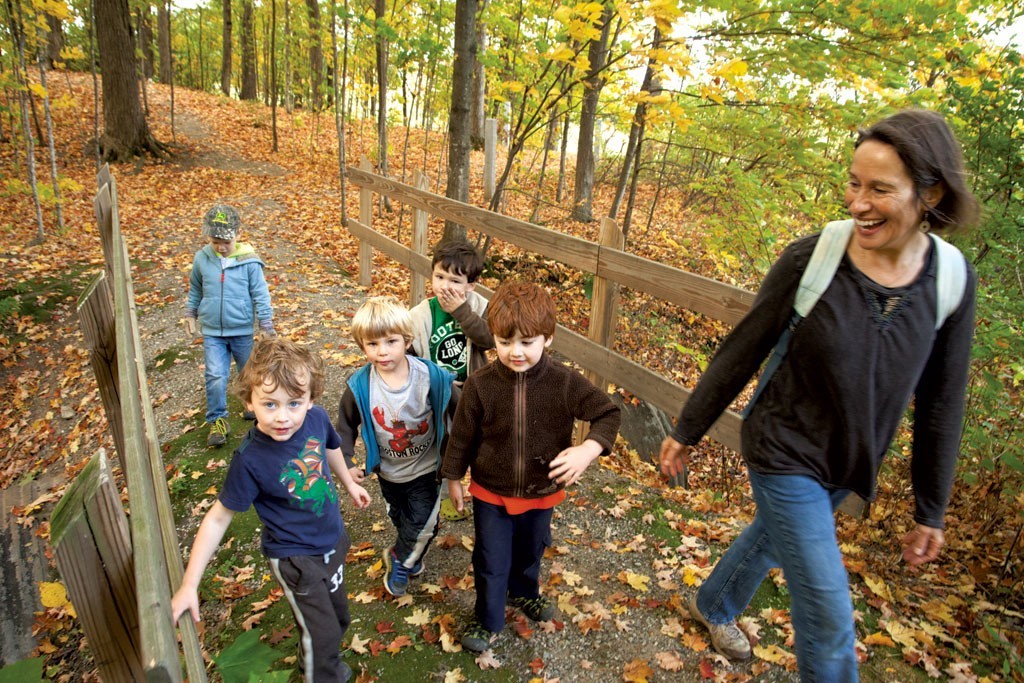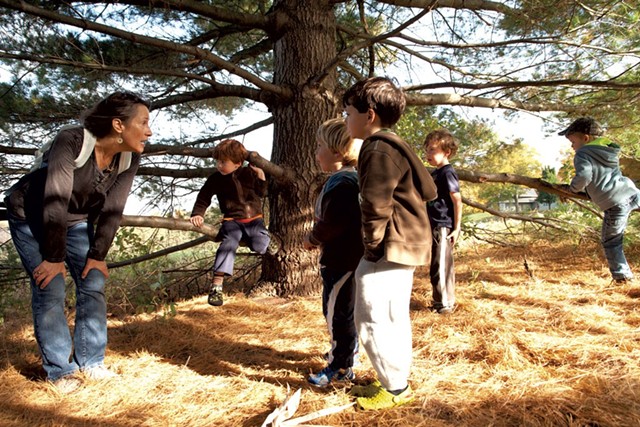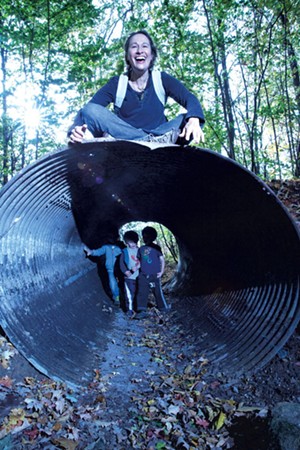Published November 4, 2014 at 11:00 a.m.
The five 4-year-old boys in Maris Rose's outdoor recreation program sit quietly in a circle on a classroom floor. Each awaits his turn to suggest a morning activity at the All Souls Interfaith Gathering on Meach Cove Farm in Shelburne. As Rose goes around the circle asking, "Peter, what do you want to do today? Ryan, what do you want to do?" the boys soon reach a consensus: They want to climb trees, build a fort and play lions in the grass.
Rose shoulders a backpack with the word "love" stitched into the canvas, then leads them to the door. Before leaving, she hushes them with one finger in anticipation of walking past other rooms in which massage and yoga instruction are under way. "Now, let's all be as quiet as butterflies," she instructs.
The boys dutifully follow Rose's instructions while they exit the multiuse building.
Once outside, the boys sprint noisily down a nature trail into the trees. When two of them stray out of sight, Rose mimics a bird call — her signal for the group to reassemble. In an instant, all five boys dash back to her, form a circle and hold hands. Rose smiles and commends their promptness, then suggests they move on to another activity.
It's not magic that enables the 58-year-old educator to get children to listen and behave. Her decades of experience working with kids of all ages, including extremely troubled teens in court-ordered group homes, taught Rose some simple but effective techniques for modifying children's behavior. Now she teaches classes based on these methods, ranging from large groups to one-on-one sessions, for parents, teachers and other professional childcare providers.
This particular program for pre-kindergarteners, called Maris' Tree House, meets once a week for four hours. For a time, the boys pretend to be lions hiding in the leaves, awaiting a passing hippo on which to pounce. When they grow tired of that game, they run down a grassy hill to a stand of pines ideal for climbing. There, the boys pretend to be orangutans, honey badgers, red foxes and, incongruously, lifeguards. Rose guides and encourages, but doesn't micromanage their imaginative play.
She never yells or says, "No!" In fact, when the boys all begin talking at once, rather than raising her own voice, Rose covers her ears in mock pain and cries, "Wait, wait, wait! My ears are full!" The only negative admonition she makes all morning is when she warns them not to throw rocks because "rocks can hurt someone."
This is a tactic she teaches to adults. She believes parents need to understand and adjust their own reactions to their children's unwanted actions. It reflects her fundamental principle of behavior modification: "That which you give attention to flourishes."
In other words, she explains, when parents shout, get angry and punish their kids for negative behavior, it only reinforces for the child that this behavior will get their parents' attention. Instead, Rose teaches parents to identify and name the unwanted behavior — whining, throwing tantrums, pulling hair, etc. — then determine what the child is trying to communicate with it. For example, is your daughter whining because she lacks the vocabulary to explain what she wants? Or because she believes you're paying more attention to her little brother than to her?
Next, Rose instructs parents to identify and name the opposite, preferred behavior — in the case of whining, a daughter using her "big-girl voice" — and then reinforce it with "calm, consistent and conscious action." So if your daughter whines for something, you might say, "How about you come back in two minutes and ask me using your big-girl voice?" Rose recommends setting a timer and asking the child to return when it goes off and then ask properly.
Rose's method involves using a "four-to-one ratio" rule when correcting unwanted behaviors. In other words, for every correction a parent gives a child, the parent should identify (or make up) four positive acknowledgements that commend the child for doing things right.
For example, if your daughter comes into the room and says, "Hi, Dad!" you might answer, "Hey! I heard you use your big-girl voice! Good for you!" (That's one.) If she plays all afternoon without whining, you might say, "I haven't heard any whining this afternoon. I've heard only your big-girl voice." (That's two.)
As Rose explains, this method should always involve brief, consistent and respectful language. It's most effective, she adds, when parents correct their children's unwanted behavior early on, before they lose patience, get angry and yell.
"By the end of the day, if you haven't reinforced for them the positive behavior, you haven't done your job," Rose adds. "What's amazing is that kids, in a very short amount of time, get what elicits socially appropriate approval."
A common mistake many parents make, Rose notes, is taking their children's misbehavior personally.
"You often hear parents say, 'Oh, they know that when they say that, it really bugs me,'" she says. "Or when a child who can't communicate their feelings says, 'I hate you! You're a bad mommy!'"
Rather than taking such barbs to heart, Rose advises parents to identify what's making their child angry or upset by saying, "It sounds like you're upset. Can you tell me why?" As she points out, many children (and some adults) lack the ability to express their feelings and take responsibility for them.
"Teach them to own their problem," she adds. "That which you own, you can change. If you don't own your problem, you can't change it."
From Big Family to Boys Town
Rose's own upbringing wasn't quite as progressive. She grew up in a large Catholic family in Rochester, N.Y. The oldest of five children, Rose recalls her family's parenting style as "strict, but in a good way. I felt like they would really listen if I had an issue, even if they couldn't always figure it out."
In her house, all the kids had chores, answered the phone using their first name and had to be excused before leaving the table. Her mother wasn't the most patient of parents.
"She yelled a lot," Rose recalls. "The joke my sister will tell today is, she's still grounded."
"But it was an Italian family," she adds, "with lots of music and singing and music lessons, and laughter and baking at Grandma's house down the street, and my dad taking us to play baseball and to the local pool ... It was so much fun."
After earning a college degree in education, Rose spent much of the late 1970s and early '80s working with her former husband at the now-famous Boys Town, in Omaha, Neb. Founded in 1917 by Edward Flanagan, a Roman Catholic priest, Boys Town pioneered an innovative approach to raising boys from broken homes and troubled pasts.
Rose, her then-husband and their two young sons lived full time in several group homes with nine boys, all of whom came from dysfunctional backgrounds. For some, Boys Town was their last stop before juvenile detention; others had been removed from homes where they'd endured physical abuse, substance abuse and mental-health issues.
"The idea," she explains "was to live with them and create a family situation with a highly trained couple, so they could have around them a functional family." There, Rose and her partner implemented a very strict behavior-modification program, which was later adopted at group homes around the country.
Whenever Rose or her husband had to do a correction, it involved a strict, nine-step procedure for the parent or teacher to follow, starting with praise, empathy or affection, then a clear description of what the child had done wrong. Using a point system, the boys either earned or lost points depending upon their behavior.
This simple approach proved very effective, according to Rose. Because all the boys were involved in every aspect of housekeeping — cooking, cleaning, laundry, grocery shopping — they became invested in their home's success. And, because the older boys lived with Rose's own sons, who were 2 and 4 at the time, the older boys learned compassion and empathy by learning to care for them, too.
After working in Omaha, Rose and her former husband traveled to other states around the country, setting up more group homes based on the same model, before finally settling in Vermont in 1988. Initially, Rose took a job as a reading teacher in the Burlington school district. About a year later, the then-director of Annette's Preschool in Hinesburg asked her if she would teach a parenting class, based on her past experience.
Rose devised her own program, which combined some of her formal training with lessons she'd learned at the group homes. About 15 years ago, Rose started teaching preschool, then launched her current outdoor rec program and parenting classes, which she's run simultaneously ever since.
Nancy Elder, director of the Charlotte Children's Center, has worked with Rose in various capacities over the last five years. Rose has trained Elder's staff and offered free parenting workshops to the center's clients.
"Maris has done this work for a lot of years, and I have a lot of confidence in her approaches to children," Elder says. "She and I are in agreement about the way we should always speak to children. We feel that on the one hand, children should always be treated with respect and kindness in your interactions with them. But at the other end, that doesn't mean being permissive. Children need guidance and boundaries, and they need to know that there is somebody watching out for them."
Now a grandmother — her sons are 35 and 33 — Rose has begun shifting her emphasis to working with parents and sharing the lessons she's learned. First and foremost, she reminds parents that good parenting is a difficult job.
"It's pretty organic and messy, being a parent and having a family," she says. "These techniques can help make things easier. But they don't make it easy."
Tricks of the Trade
On time-outs: Time-outs can be effective, Rose says, as long as they're not overused or seen as punishment. Because "time out" has so many meanings, she prefers to use a "remembering chair," where kids take a break from activities. "I can see that you're not ready to play carefully with your friends," she might tell a misbehaving child. "You can go over here and look at a book for a few minutes ... I'll call you back in a minute."
Coping with disappointment: What do you do if your child wasn't invited to a friend's birthday party? You can charge over to the other parent's house and demand your kid be invited. But a better option, Rose says, is to listen to your child and help her process her feelings: "Oh, your friend is having a party? You must have felt sad when you heard that. Parties are fun to go to. Yes, I understand. Thanks for telling me about it. Is there something I can do to make you feel better?" You've affirmed your child's feelings but didn't blame someone else, which would only encourage a victim mentality.
On power struggles with kids: There are as many reasons for power struggles as there are types of parents, Rose says. Some parents fear looking weak, to their children or others, if they cede any ground. Rose suggests not pushing back. "It takes two to have a power struggle," she says. Sometimes parents need to let kids learn the logical consequences of their behavior. "I've had children delivered to me in pajamas because the parents weren't going to have a power struggle."
At the same time, she cautions, "families are not democracies, but benevolent dictatorships." Sometimes parents must have their way, shrug their shoulders and say, "You're disappointed. I understand."
On helicopter parenting: Overprotection does kids no favors later in life. "Some people equate their child's disappointment and temporary unhappiness with something that's going to affect them for years on end," she says. "But it's really important for children to have age-appropriate disappointment and frustration. Frustration, then practice, then mastery is part of how we grow. What we're doing when we're over-parenting or helicoptering or managing things too much is, we're robbing our children of that ability to get stronger, to build resilience."
This article was originally published in Seven Days' monthly parenting magazine, Kids VT.
More By This Author
About the Artist

Matthew Thorsen
Bio:
Matthew Thorsen was a photographer for Seven Days 1995-2018. Read all about his life and work here.
Matthew Thorsen was a photographer for Seven Days 1995-2018. Read all about his life and work here.
Speaking of KidsVT - Features,
-

Back to School During Delta: A Pediatrician With Young Children Offers a Road Map — and Survival Strategies
Aug 24, 2021 -

Can You Dig It? Make Your Own Worm Farm With These Simple Steps
Aug 24, 2021 -

Mr. Fix-It: Marty Spaulding Works Behind the Scenes to Help Students Learn on Campus
Aug 24, 2021 -

How to Savor Vermont's Shortest, Sweetest Season
Jun 29, 2021 -

Good Citizens Rocked the At-Home Challenge
Apr 6, 2021 - More »
Comments
Comments are closed.
From 2014-2020, Seven Days allowed readers to comment on all stories posted on our website. While we've appreciated the suggestions and insights, right now Seven Days is prioritizing our core mission — producing high-quality, responsible local journalism — over moderating online debates between readers.
To criticize, correct or praise our reporting, please send us a letter to the editor or send us a tip. We’ll check it out and report the results.
Online comments may return when we have better tech tools for managing them. Thanks for reading.

















































